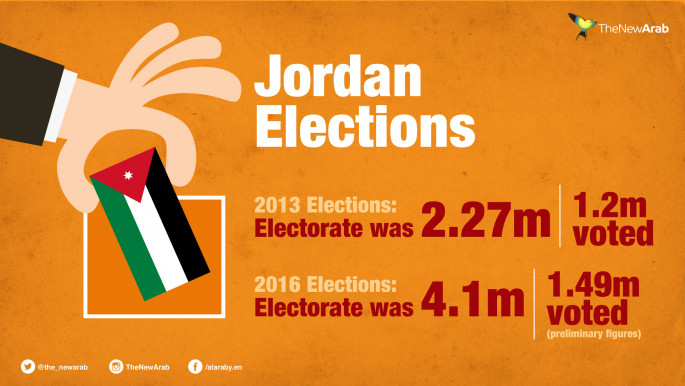Jordanian parties 'concerned' over delay of election results
Several Jordanian parties and coalitions have voiced concerns over the delay in announcing the results of the general election that took place on Tuesday.
"We are surprised by the delay in announcing the results of some constituencies," the National Coalition for Reform said in a statement on Wednesday, adding that the delay was "not reassuring".
The Civil Coalition for Monitoring Elections and the Performance of Elected Councils (Rasid) has also warned of the consequences of the delay in announcing the preliminary results, saying that it would "increase the chances of tensions between the candidates and their supporters".
The Independent Election Commission has only announced preliminary results for 11 out of 23 constituencies so far, almost 24 hours after polls closed.
It said other results would be announced "as and when" they were known.
According to the available results, the influential Muslim Brotherhood appears to be returning to parliament as a significant opposition force.
A senior Brotherhood official said the results indicated group was on course to win at least 16 seats in the 130-seat chamber.
"The presence of other parties will be very weak," Brotherhood second-in-command Beni Zaki Rsheid told AFP.
"The vast majority (of lawmakers) will be made up as usual of deputies already close to power."
This year the Brotherhood is competing for the first time since 2007 after boycotting two previous polls in protest at the electoral system and alleged voting fraud.
In recent years, the movement suffered several splits, with one breakaway faction recognised by the government as the official Brotherhood, while authorities closed offices of the original group.
 |
| [Click to enlarge] |
As well as the performance of the Brotherhood's Islamic Action Front (IAF), attention surrounding Tuesday's polls was focused on the low turnout, with just 1.5 million Jordanians (37 percent of eligible voters) opting to cast ballots, compared to 56 percent in 2013.
"It is a serious wake-up call to think about (whether) the political system matches the needs of the Jordanian citizen," said Anja Wehler-Schoeck, who observed the election for the pro-democracy Friedrich Ebert Foundation that is linked to Germany's Social Democratic Party.
Experts say the low turnouts raised concerns about widespread apathy, reflecting a lack of enthusiasm among voters for a parliament with limited power to affect government policy.
King Abdullah II can appoint and sack Jordan's military and intelligence chiefs, senior judges and members of parliament's upper house without government approval.
With previous elections dogged by allegations of vote rigging, Tuesday's vote passed largely without incident, in spite of what the Islamists said were "several" irregularities.
Voting was monitored by 14,000 local observers and more than 650 from abroad.
Speaking at the New York at the UN General Assembly, Abdullah said Jordan had pulled off a "real victory" by holding successful elections during turbulent times.
"This is a process we are engaged in despite the unrest in the region and the burden of refugees," the king said.
The vote comes as Jordan, a key Western ally, wrestles with the spillover of wars in Syria and Iraq while hosting hundreds of thousands of refugees.
Agencies contributed to this report.
![Jordan elections [Anadolu] Jordan elections [Anadolu]](/sites/default/files/styles/large_16_9/public/media/images/B20CA114-D97A-4644-9E36-4FB6716A2C7A.jpg?h=d1cb525d&itok=lIRe2GAQ)


